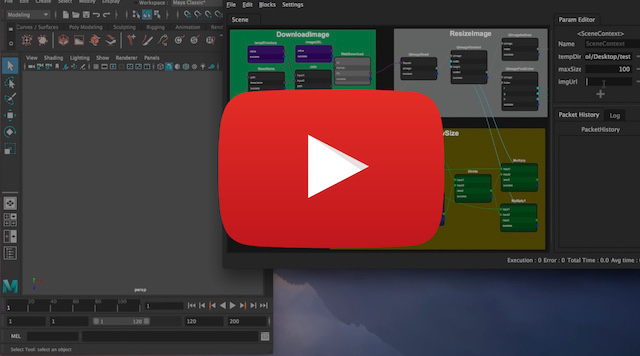PetitBloc is a process chain framework, implemented in python. This concept is derived from Flow Based Programming by J. Paul Rodker-Morrison, and since it is implemented in Python, it can be used on almost all of the platforms and softwares that Python can be run.
Nodz and Qt.py are used for its GUI.
Qt python module is required (PySide1 or 2, PyQt4 or 5).You can make and run the process graph on PatitBloc GUI, or it can be run with python IDLE or standalone.
- python
import petitBloc.ui
petitBloc.ui.Show()- standalone
bin/petitBlocUIThe graph(.blcs file) can be called without GUI from python IDLE or petitBloc CUI.
- python
import petitBloc
petitBloc.Run(path=<blcs file>)- CUI
bin/petitBloc -s <blcs file>More details of CUI 'petitBloc --help'
- Block : a basic unit of process
- Box : network of processes
- Packet : a basic unit of information
- Port : connection between processes, sending or accepting packet
- Parameter : attributes for block
Box is a network of Blocks. It contains several Blocks or Boxes and connects inside and outside. ConditionalBox has a port named 'condition' and it won't run its network until the 'condition' accept the packet which is value 'True'.
Parameters can be set by expressions with '='.
e.g.
= 1 * 2
= "test{}".format(1)
And it can reference other parameters of itself or others with absolute path or relative path.
e.g.
= ../@test * 2
= /scene/Box@test * 2
To get any environment variables, use '$'. e.g.
= "$PATH"
SceneContext is an unique block in the scene and contains user defined parameters. These parameters can also be referenced in the expression with “$.
= $testInt * 2
= "$testString" + " test"
When execute the scene with CUI, parameters and sceneContext can be overridden with '-p', '-c'. (More details 'petitBloc --help')
You can write some low-level or high-level blocks as a py file, and the directory has to be added to PETITBLOC_BLOCK_PATH environment variable.
from petitBloc import block
class PlusNumber(block.Block):
def __init__(self):
super(PlusOne, self).__init__()export PETITBLOC_BLOCK_PATH=$PETITBLOC_BLOCK_PATH:<file directory>
or
set PETITBLOC_BLOCK_PATH=%PETITBLOC_BLOCK_PATH%;<file directory>And add any ports or parameters in the initialize method.
...
def initialize(self):
self.addInput(float, "input")
self.addParam(float, "number")
self.addOutput(float, "output")
...Possible to declare that the port is optional explicitly.
Also possible to link a port and a parameter. (More detail)
...
def initialize(self):
self.addInput(float, "input1", optional=True)
inport = self.addInput(float, "input2",)
num_param = self.addParam(float, "number")
inport.linkParam(num_param)
...Write processing of a packet(s) into process() method. The process() method will be called by run() method, and when the process() returns True, the block will keep accepting packets from input ports.
...
def process(self):
input_packet = self.input("input").receive()
# EOP means 'End of Packets'.
# The previous process was done, so no more packet to process
if input_packet.isEOP():
return False
value = input_packet.value()
# drop() will decrease reference count of the packet.
# Ofcourse python has a garbage collection, so we probably don`t worry about deleting the variables,
# but this way make it more clear and to do it accurate time.
input_packet.drop()
number = self.param("number").get()
self.output("output").send(value + number)
return True
...In some cases, we want to determine how the loop works. We can describe it with overriding run() method.
By default, run() method will work like this.
...
def run(self):
while (True):
if not self.process():
break
...Basically process() requires one packet at a time from all ports, and this may be inconvenient in some cases. You can find several examples of asymmetric packet processing in blocks/stringBlocks.py
You can specify the styles of blocks in the "block file name".config.
If you want logging of some information, you can output it with debug, warn or error method.
...
self.debug("DEBUG TEST")
self.warn("WARNING TEST")
self.error("ERROR TEST")
...

